Gena
Rowlands is devoted to denying the realities of Cassavetes’ life
and work and to creating an unreal, untrue myth. Not surprisingly, given
the star-struck Hollywood culture in which we live, it has been all too
easy for her to find sycophantic collaborators willing to do her bidding
and tell the story the way she dictates. Prof. Carney has stood out from
the crowd in his attempt to fight for the truth. Gena Rowlands has waged
a campaign devoted to savaging Prof. Carney's reputation for telling the
truth about John Cassavetes' life and work. She is terrified of the truth
and interested in covering it up and denying it. Click
here for a glimpse of what Cassavetes was really like as a person
and an illustration of the kinds of facts that Rowlands is retaliating
against Carney for revealing. Her treatment of his Shadows and
Faces finds, and her insistence that Criterion remove his name
from the Cassavetes box set that he spent more than eight months helping
to create are part of her attempt to silence him.
Click here to read about Gena Rowlands's perpetuation of a Disneyland version of Cassavetes' life and work, her attempts to control what is written about Cassavetes, and her retaliation against scholars who try to tell the truth. For a counter-example
of how research should be done, see Ray Carney's description of how he
researched and wrote his Cassavetes on Cassavetes and Shadows
books, click
here.
To
read a chronological listing of events between 1979 and the present connected
with Ray Carney's search for, discovery of, and presentation of new material
by or about John Cassavetes, including a chronological listing of the
attempts of Gena Rowlands's and Al Ruban's to deny or suppress Prof. Carney's
finds, click
here. Click on page 5 (2006 - 2007) to read about two other hero-worshipping, star-struck, sentimental biographical portraits of Cassavetes.
To read another
statement about why Gena Rowlands or anyone else who acted in Cassavetes'
films or someone who knew Cassavetes is not the ultimate authority on
the meaning of his work or on how it should be cared for or preserved,
click
here.
To read about
Carney's being blackballed by Rowlands from contributing to another DVD
project, and about Seymour Cassel's being put in his place and, at Rowlands's
behest, making (foolish and incorrect) comments that "there is no
first version of Shadows" in the voice-over commentary to
the Shadows disk, click
here.
Click
here for best printing of text
CHARLES
KISELYAK'S CONSTANT FORGERY
FIGHTING FOR TRUTH
IN OUR CULTURE OF UNREALITY:
THE CHALLENGE OF DOCUMENTARY FILMMAKING
(An Interview with Ray Carney)
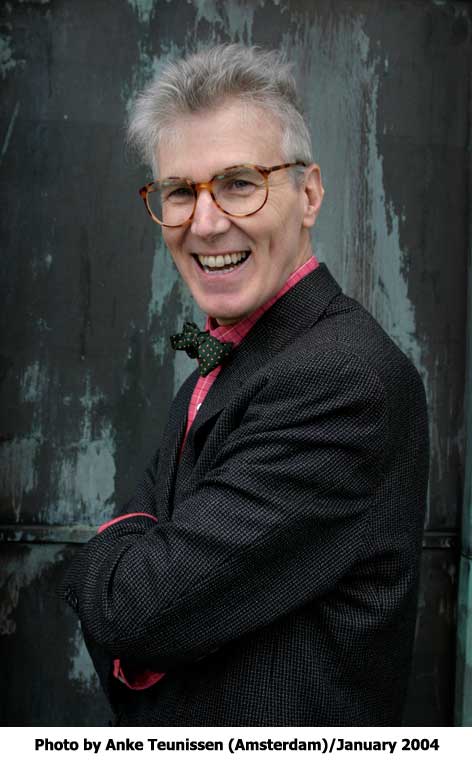 There
are a number of documentaries about Cassavetes. Can you talk about them? There
are a number of documentaries about Cassavetes. Can you talk about them?
I’d rather not.
Why not?
None of them is very good.
It’s a depressing subject.
Have you
seen all of them?
Oh, yeah. I was even the
scholarly advisor on one and wrote the script.
Which one?
Charles Kiselyak’s A
Constant Forge.
I’ve seen it. I
like it.
I call it A Constant Forgery.
I take it that means you
didn’t like it?
It’s a joke. It gives
a completely romanticized picture of Cassavetes. Ezra Pound used to
say that if you wanted to see how bad the encyclopedia was, you should
read an entry about something you knew really well. Then you could
see how far off all of the other entries are. I’m sure
everyone has had a similar experience at some point in their lives
with the newspaper. That when you actually were at an event you later
read an article about, you realized how biased or limited the treatment
of everything was. Well, it’s the same with Cassavetes.
If you know nothing about Cassavetes’ life when you see Kiselyak’s
film, it seems great. But if you know anything, you realize how unbelievably
superficial it is.
I’m not a big fan of
those formulaic, one-size-fits-all biographies that air on MTV, A&E,
or PBS, but, to tell you the truth, the ones I’ve seen about
Lucy and Ricky, Louis Armstrong, and the BeeGees are deeper and more
perceptive than Kiselyak’s movie.
I think it’s a difficult
genre to succeed in.
What do you mean by that?
It’s hard to get at
the truth. Everything works against you—both human nature and
the nature of filmmaking.
Why is that?
Original sin.
No, seriously….
The films that have been
made about Cassavetes are slipshod and superficial for the same reasons
most other things in our culture are slipshod and superficial. The
filmmaker’s laziness, stupidity, cravenness, cowardice, fear,
desire to flatter, need to please.
Look, the fallacy is that
if you take a camera and put it in front of a bunch of people who knew
Cassavetes and ask them to talk about him and get it all down on film,
you’ve made a movie about him. It just doesn’t work that
way. That’s a recipe for getting almost nothing valuable. There
are all sorts of things that get in the way of truth.
Like what?
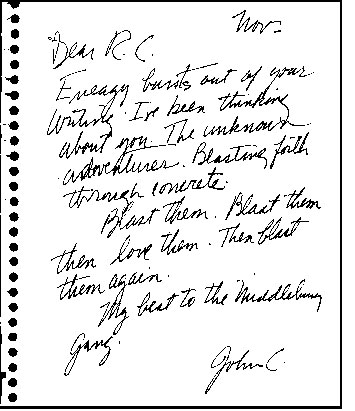 Well,
start by considering who is interviewed. If you are dealing with an
actor or a director, most of people you’re going to be interviewing
are actors. Not exactly the intellectual heavy-lifters in our culture.
On top of that, the people Kiselyak chose to talk to were all friends
of Cassavetes—in the case of people like Seymour Cassel or Lynn
Carlin or Lelia Goldoni, people who owed their careers to him. Now
what are they going to say? Nothing unflattering or critical. That’s
for sure. Well,
start by considering who is interviewed. If you are dealing with an
actor or a director, most of people you’re going to be interviewing
are actors. Not exactly the intellectual heavy-lifters in our culture.
On top of that, the people Kiselyak chose to talk to were all friends
of Cassavetes—in the case of people like Seymour Cassel or Lynn
Carlin or Lelia Goldoni, people who owed their careers to him. Now
what are they going to say? Nothing unflattering or critical. That’s
for sure.
So what do you get? Sound
bites—a series of short anecdotes that weren’t true the
first time they were told thirty years before. You can hear the same
set of stories about Steven Spielberg or George Lucas on Charlie
Rose every week—or at any film festival Q&A—just
change the names: “What was it like to work with X, Y, or Z?” —“Oh,
he/she was wonderful. Such a creative, wacky guy/gal.” And the
ending is always the same: “How lucky I was to work with him/her.” It’s
a cartoon version of life and art.
What kind of understanding
can you get from a bunch of funny stories anyway? Save them for a dinner
party! We’d detect the silliness instantly if someone did this
to something we really truly cared about. Can you turn your relationship
with your boyfriend into a series of anecdotes? Can you turn your understanding
of Bach or Shakespeare into them? “Oh that Bach, he was so much
fun to be around, such a wild and crazy guy. I remember the time....” [laughs]
If you were dealing with anything but film it would be obvious how
trivial a bunch of anecdotes are in understanding art. But for some
reason we don’t detect the fraudulence if we’re talking
about film. It’s probably because we have such a low opinion
of the art to start with.
I guess talking
to Gena Rowlands would be the exception.
That’s another fallacy.
Why do we think the filmmaker’s 74-year-old widow has all the
answers? Do we ask Hitchcock’s widow about the meaning of Vertigo?
Do we ask Beatrice Welles about Citizen Kane? Would we ask Anne
Hathaway what Hamlet was about? We don't ask Lady Agnew to interpret
John Singer Sargent's portrait of her. Just because you were there
when something was done, doesn't make you an expert on it. Someone
who acted in a movie doesn't necessarily have a deep understanding
of the character or the film. It's an unfortunate but true fact that
Gena Rowlands doesn’t have a particularly deep understanding
of the films. Listen to the commentary she did for the DVD of Minnie
and Moskowitz if you have any illusions about that. And what she
knows about Cassavetes the person, she’s not telling.
I’m not sure how
to take your comments. Are you saying that people shouldn’t
make documentaries about filmmakers?
No. My point is that getting
something truthful, deep, perceptive in a film—any film, a feature
or a documentary—involves more than plunking a bunch of movie
stars down in front of a camera and asking them to tell stories. It’s
a challenge—because they will always be more interested in looking
and sounding good—or getting a laugh—than in telling you
something complex and insightful and true. Particularly movie stars—who
are masters at playing for a camera.
But, listen, don’t misunderstand:
I’m not blaming the people interviewed for the superficiality
of the documentaries. They are just being obliging and saying what
they are able to. The failure is the filmmaker’s, not theirs—because
it’s the filmmaker’s duty to dig beneath the surface.
And the problem is not limited
to movie star commentary or documentary films. Almost nobody tells
the truth in this sort of situation unless you force them to. We live
in a haze of clichés most of our lives. Think of political rallies.
Or what goes on in the classroom. Most people don’t really think unless
you make them do it.
But you can make someone
think. You can break through the clichés if you work at it.
But to do that, you have to know your subject inside-out. That was
the problem with Kiselyak. He knew too little about Cassavetes and
was too in awe of the people he was interviewing to detect when he
was being fed a line of bull.
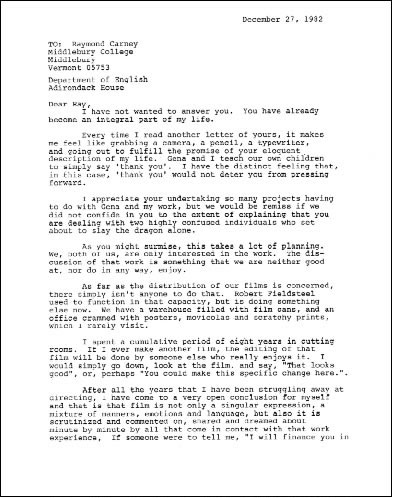 I
thought you said you were the scholarly advisor on the film. Why didn’t
you tell him this? I
thought you said you were the scholarly advisor on the film. Why didn’t
you tell him this?
I told him but he wasn’t
interested. It represents such a different point of view from his own,
that I don’t think he could even hear what I was saying. Bear
with me. You have to know a little background to understand this. Kiselyak
began this project with only a passing knowledge of Cassavetes’ work.
He knew even less about Cassavetes’ life. He is a Los Angeles
free-lance “industrial” filmmaker. He makes documentaries
for a living. From what he’s told me, he’s mainly worked
for Pioneer. He makes documentaries to be included with their video
releases. He was hired to do the Cassavetes film to accompany Pioneer’s
release of the Cassavetes box set—though after the documentary
was completed Pioneer cancelled the box set because they didn’t
think they’d make enough money on it. The documentary was just
another job to him. He was doing it strictly for the money.
He called
me up when he got the assignment and confessed that he had not seen most
of the films and didn’t know very much about Cassavetes. He asked
me to fill him in on what he needed to know, who he should interview,
what documentary footage of Cassavetes was available, etc. etc.. He asked
me if I would be the scholarly advisor.
The events that followed taught
me a few lessons about the power of money in our culture. Here I was—someone
who had spent a lifetime studying Cassavetes’ work, someone who
had struggled year after year to get books and essays published against
all sorts of resistance, who had ultimately had to finance several
of them at my own expense to get them out there, who had spent tens
of thousands of dollars of my own money to celebrate and promote Cassavetes’ work.
And I get a phone call from this guy who hasn’t even seen all
of the films, and knows almost nothing about Cassavetes except what
he read on the Internet Movie Database, and he tells me he has been
given a lot of money—I later learned he spent something like
$200,000—to make a movie about him.
It kind of took my breath
away. This guy didn’t think he had to have seen the movies to
make his film. He wasn’t doing it out of passion and conviction.
It was a job.
This is a world I had almost
no contact with up to this point. I was so naïve. I had never
even thought of someone doing something like this strictly for the
money. Of course I’ve since realized that that’s the way
a lot of things are done. Even books. But it’s completely different
from the way I work.
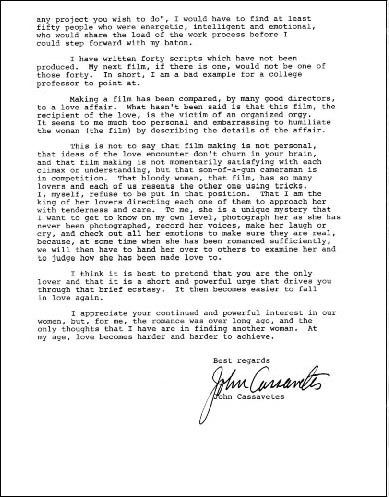 How
long ago was that call? How
long ago was that call?
Oh, a long time ago. Back
in 1999 I think. It was the beginning of a long saga. I’m a little
older and wiser now. A little less innocent.
What do you mean?
Well, obviously he had called
the right person. I spent days, weeks, months briefing him. I put him
in touch with crew members and people who had known Cassavetes. I searched
out documentary footage—and found some great stuff by Andre Labarthe
and Tristam Powell. I sent him essays and books I had written. And
then got ripped off.
Ripped-off?
It’s the story of my
life. Dumb, da-dumb, dumb. I did hundreds of hours' worth of work for
him. I sent him material—information that no one else on the
planet had. I put him in touch with people to interview. I located
documentary material for him to include in his movie. I send him a
shortened, edited form of my Cassavetes on Cassavetes book,
which hadn’t been published at that point, where Cassavetes talks
about his life and work in his own voice, which ultimately became the
voice-over narration for the film.
He assured me over and over
again on the phone, in face to face conversations, and by email that
my collaboration would be handsomely acknowledged and remunerated.
But since I never got a formal contract putting it all in writing,
it all got forgotten in the end.
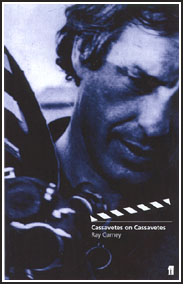 What
do you mean? What
do you mean?
I mean that all he did was
insert a brief mention of my Cassavetes on Cassavetes book at
the end of the credits, after most people have stopped watching. Nothing
else that he had promised. No credit as the scholarly advisor. No credit
as the script writer. And of course not a penny for any of it.
Looking back on it now, I
should have realized I was being set up for a massive scholarly rip-off
when he was doing on-camera interviews and made me pay my own expenses
to fly in and be interviewed.
What do you mean?
Well, at the point Kiselyak
was scheduling on-camera interviews, it became pretty obvious that
he wasn’t interested in digging into Cassavetes’ life and
work in a meaningful way, but merely in getting the biggest names he
could to appear in his film. He would call me up and tell me what a
coup he had scored in getting Sean Penn. Peter Falk, Ben Gazzara, Jon
Voight, or someone like that. He spent months flying around the country
pursuing Scorsese! But he never did get him. [laughing] The point was
to get “names” into his movie. And I wasn’t a “name,” so
when it came time to interview me he told me if I wanted to be on camera,
I should please pay my own expenses there and back. It was a complete
movie-star suck up, and I wasn’t a movie star.
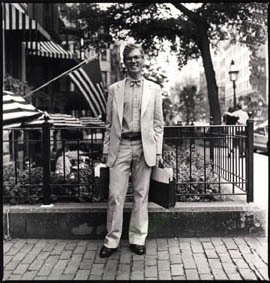 Did
you have input into who he interviewed? Did
you have input into who he interviewed?
I provided some of the contact
information—and also tried to move him beyond celebrities. I
gave him names of these really interesting people who knew Cassavetes—crew
members, drinking buddies, friends; a few of the names I gave him got
in the film—Tom Noonan, Lelia Goldoni—but he wasn’t
interested in most of them because they weren’t famous. When
I explained the value of having the other kind of people in the film,
lower-level people who could talk more personally, less guardedly,
more intimately about Cassavetes the man, I don’t think he could
understand where I was coming from.
Why?
He’s a Hollywood person.
He lives in Los Angeles. He is impressed by big-names. In that respect,
he’s as star-struck as a teenager in Omaha. He doesn’t
understand any other way of being. His proof to himself that he is
doing something important is that he got an interview with “Columbo.” And,
speaking more practically, he’s afraid that no one will watch
his movie if it doesn’t have “name” interviews. It’s
what gets you on the Sundance Channel.
He used to call me up and
tell me stories about how he got to be friends with Oliver Stone by
making his movie about him. After he did this film, he would call and
tell me when Rowlands invited him up to the house for drinks. It really
mattered to him. I thought it was comical and a little pathetic.
Couldn’t you talk
to him about the star-struck nature of film culture?
I said it over and over again.
I laughed out loud when he told me how much time he was spending trying
to chase Martin Scorsese down to interview him. But he just didn’t
seem to understand.
Couldn’t you work
it into your film interview?
Saying something on camera
doesn’t get it into the film. Kiselyak filmed something like
three hours of me talking. Though I never sat down and tallied it up,
I’d estimate that something like three or four minutes made it
into the film. He probably didn’t want to cut into Sean Penn’s
time.
What do you think of the
poetic quotes?
Aren’t they embarrassing?
They make me cringe. It’s always amusing to see one of these
Hollywood types try to be “deep.” Try to be “serious.” I
have no idea what they mean. Even the title of the movie seems silly
and pretentious to me. What’s a “constant forge” anyway?
[laughing] I can understand “constant forging” by a “constant
blacksmith,” but what does it mean to call the forge itself constant?
You have to admit that
the end, where Cassavetes sings, leaves you with a lump in your throat,
doesn’t it?
I put Kiselyak in touch with
the guy who had those tapes: Bo Harwood. It’s great to hear Cassavetes’ voice.
The best moments in the film are when Kiselyak steps aside and simply
shows footage of Cassavetes performing for the camera—or for
the microphone in this case. I agree that the song is interesting.
But the film itself does nothing to dig into what it reveals in terms
of his life and work. The lump in your throat part of it is just a
cheap melodramatic effect. A way of ending the movie with a sentimental
twinge. The old voice from the grave device.
Can you be more specific
about your problems with the film?
Sure. But as I already said,
you won’t see them if you don’t have some independent base
of knowledge to check the film against. The less you know about Cassavetes,
the better Kiselyak’s movie looks; the more you know, the more
you see how evasive and superficial it is. Kiselyak himself still probably
doesn’t see the fraudulence of what he did because he still doesn’t
know enough about Cassavetes' actual personality.
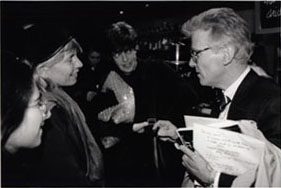 Maybe
that’s the reason I react so strongly against the final singing
stuff. Because I see it as being of a piece with the rest of the movie
in terms of trying to sell us this sentimental, soap-opera version of
who Cassavetes was. It’s not true. It’s a fairy-tale account.
Kiselyak doesn’t come within a thousand miles of capturing the man
who actually made those tough-as-nails movies. Maybe
that’s the reason I react so strongly against the final singing
stuff. Because I see it as being of a piece with the rest of the movie
in terms of trying to sell us this sentimental, soap-opera version of
who Cassavetes was. It’s not true. It’s a fairy-tale account.
Kiselyak doesn’t come within a thousand miles of capturing the man
who actually made those tough-as-nails movies.
Almost all of the interesting
sides of Cassavetes' personality and all the important events and relationships
in his life outside of the films are missing: Where is his relationship
with Rowlands? Where is his relationship with his family and his friends?
Where is the rest of his life? He doesn't have one! And where is the
rest of his personality, his behavior, his character? Where is the
clown and show-off? The fast-talking wheeler-dealer? The hustler and
con-man? Where is the alcoholic? The demon-haunted loner? The womanizer?
The charmer? The bullshit artist? Where is Cassavetes the suspicious,
the sarcastic, the nasty and vengeful—your worst nightmare if
you dared to double-cross him, question his judgment, or get in his
way? Where is the Cassavetes of tears and rages and knock-down, drag-out
fights?
The result of leaving out
all of this is the rankest of hero-worship. Cassavetes has no shortcomings
and no flaws. He has no tangibility, no reality. From Kiselyak's movie,
you'd think Cassavetes was some kind of disembodied spirit of cinema,
with no problems, no doubts, no struggles, and no existence outside
of his movies. Even The Glenn Miller Story and Lust for Life are
deeper than this! They at least understand that art doesn't emerge
from an artist's head full-blown, full-grown. They understand that
human beings make it—complicated, flawed, confused, mixed-up
human beings.
Constant Forge is just
as sentimental in its treatment of the production and release of the
films. Cassavetes is a barrel of laughs: his crews are one big happy
family; and making the movies is a gigantic party. Wow. Hey, guys,
let’s all go make a movie. It sure is fun! All of the difficulties
of fund-raising, production, promotion, distribution, and exhibition
are left out. Where are the struggles with cast and crew? The shouts
and arguments during the shoots? The firings of crew members? The fights
with Rowlands over the financing? The fights over her acting? The critical
abuse? Where are the jeers and cat-calls? Where are the financial losses?
The sheer work, the ballsiness, the guts of making the films and fighting
to get them into theaters is all left out. It’s a Disney movie.
It might as well be the Ron Howard story.
Most glaringly, there is virtually
no intellectual content to the film. No ideas. No cultural history.
Nothing about the state of American independent film in the 1960s and
1970s. Nothing about what was happening in other arts like jazz and
expressionist painting, arts that are related to what Cassavetes was
doing in film. Nothing about the stupidity of Hollywood. Nothing about
American society. Nothing about the differences between art and entertainment.
A bunch of funny stories and clever anecdotes just don't cut it. It's
the talk show version of Cassavetes' life. Ultimately, it's an insult
to Cassavetes' work and art to reduce it to funny stories, to strip
the ideas, the history, the circumstances away from it.
Was any of this in the
material you gave him?
Yes, but it was left out
of the film. Even in terms of the voice-over script, he heavily edited
what I gave him to maximize the “happy face” side of things.
Does leaving out things
like that really matter?
A lie is a lie is a lie.
And lies will kill you. Our culture is dying of lies. Is everything
PR? Is everything politics? Is everything bullshit? Even Cassavetes’ life
story? Even an account of who he was and how he made his movies? He
devoted his life to truth-telling. Is the truth too dangerous to grapple
with? You know, the effect of lying in a documentary like this is even
worse than the effect of lying in a feature film, because we already
know that Hollywood movies sentimentalize, soften, purify reality.
But young filmmakers will watch this movie and fall for its lies. And
then they will think they are not right or normal, because their lives
are not this way.
Of course I don’t have
to point out that it’s particularly ironic to make this kind
of movie about this kind of filmmaker—to be sentimental about
the least sentimental filmmaker who ever lived.
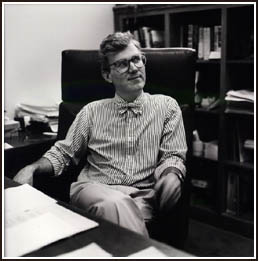 That’s
not really what I was asking. What I meant was don’t Cassavetes’
films stand outside of these personal issues? Does it matter what kind
of person he was or how he made his movies? That’s
not really what I was asking. What I meant was don’t Cassavetes’
films stand outside of these personal issues? Does it matter what kind
of person he was or how he made his movies?
If Cassavetes was a Hollywood
hack, turning out mass-produced confections in a corporate environment,
it wouldn’t matter. We don’t need to know about Thomas
Watson’s personality to understand IBM’s computers. But
we’re talking about the most personal filmmaker America has ever
had. These are the only things that do matter. Cassavetes’ crazy
rages, insecurity, sense of rivalry, and all the rest throw a lot more
light on what these films mean than a parade of comical anecdotes do.
Heck, I’ll go further: I’d say you can’t really understand
Freddie, McCarthy, Moskowitz, or Mabel Longhetti in the deepest way,
without understanding Cassavetes’ personality.
This is not about muck-raking
Cassavetes' life. I am not interested in being an Albert Goldman or
Kitty Kelley. This is about understanding where the art came from.
It's about understanding the art. I am not interested in the life but
the work. The life changes your understanding of the work. You can't
understand the films without understanding Cassavetes' life and personality.
Of course, when I tried to say this on the Criterion disks, I was fired.
That process of understanding is what Rowlands wants to prevent and
Kiselyak wasn't interested in in the first place. Just the way they
do with George Bush or John Kerry, people prefer the PR version. It's
easier, neater, clearer, simpler. Truth is harder and more complex.
That complex knowledge is what I've devoted my life to.
Can you be more specific
about how Charles Kiselyak could have gotten these things into his
film?
Sure. Start with who he interviewed.
Kiselyak rounded up the usual suspects—the same people you’d
pick to speak at Cassavetes’ memorial service. How about including
a few people who would talk about him more critically? Erich Kollmar shot
Shadows and has never been paid a penny for his work because Cassavetes
turned on him after the film was complete. How about asking Kollmar to
tell what happened? David Pokotilow, who co-stars in Shadows, was
treated the same way. How about interviewing him? How about interviewing
Caleb Deschanel, who was D.P. on A Woman Under the Influence, until
Cassavetes threw him off the film? He has lots of stories to tell about
the way the shoot was conducted. How about interviewing John Badham and
Richard Donner and Ned Tannen—directors and producers who crossed
swords with Cassavetes in the 1970s. They would tell you things that don’t
jibe with the Lives of the Saints.
But even with the people he
interviewed, Kiselyak squandered his opportunity. Jon Voight tells
a silly “chicken story” about rehearsing the play version
of Love Streams. Another wild and crazy guy anecdote. Wow. But
what Kiselyak never asked Voight was why if Cassavetes was such a great
guy, Voight disliked working with him and distrusted his direction
so much that he pulled out of the film shoot two weeks before it was
scheduled to begin. Cassavetes had to step in to play the lead himself.
Or here’s another example:
Kiselyak interviewed Rowlands at length, but never asked her about
the verbal abuse her husband heaped on her during the shoots. A
Woman Under the Influence was especially awful. It was so bad she
could never bring herself to watch the movie.
But to ask these sorts of
questions, you’d have to know something before you went into
the interview. You’d have to have done some homework. And also
be brave enough to ask the questions on camera.
Do you know how Rowlands
felt about Kiselyak’s film?
She loved it! She still loves
it! My reservations about including it in the Criterion box set—and
I expressed them very politely, very deferentially—are one of
the reasons she had me fired from that project. Moral: don’t
disagree with Gena.
(Click
here to read about Rowlands's attempts to force Carney to suppress
his discovery of the first version of Shadows. Click
here to read
more about Carney's work on the Criterion Cassavetes box set and
Criterion's decision to let Rowlands censor what got into the set
and have Carney fired from the project. Click
here to read about
Rowlands's attempts to force Carney to suppress his discovery of
the long version of Faces.)
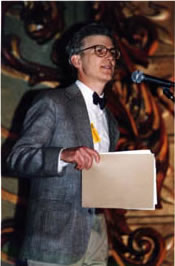 Why
would she like something that was shallow and superficial? Why
would she like something that was shallow and superficial?
That's why. She liked Kiselyak's
movie precisely because it's the PR version of Cassavetes' life. Movie
stars telling funny stories about a wild and crazy guy. She has a very
definite idea of what should and should not be said.
You can think of it as that
kind of Norma Desmond syndrome that afflicts big movie stars when they
start believing their press releases, their publicist, and their star-struck
fans, and confuse themselves with royalty—that feeling that they
are entitled to stage-manage reality, that intolerance of anyone who
has an independent view of anything. She brooks no contradiction. That's
why I took a bullet for not playing lap dog. Sic the lawyers on me.
Have me fired from the Criterion project. Get Peter Becker to jump
through her hoops. God save the Queen!
There are lots of “ground
rules” when you interview her—things she won’t talk
about, questions she won’t answer. But, when someone like Kiselyak
is interviewing her, she doesn’t have to spell it out. He knows
without being told what to ask and what not to ask.
How?
The same way you do when
you talk to anyone.
What do you mean?
It really mattered to Kiselyak
that Rowlands liked his movie. I remember how he called me up after
he had sent her a rough cut and told me that the payoff was that she
had invited him up to the house for drinks. That really mattered to
him. He must not have gotten enough love as a child. He’s still
trying to get more. He was putty in her hands.
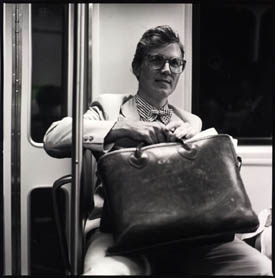 What
do you mean by that? What
do you mean by that?
It’s like I said about
Kiselyak being star-struck by Oliver Stone. If you are making a movie
about someone and are interested in being friends with them, you can’t
go into certain areas that might make them uncomfortable.
It’s fatal to want to
be liked or want someone’s approval when you do this sort of
project. It puts limits on what you can say and do. To be true to anything—in
art or life—you have to find a way of not caring whether people
like you or not. Cassavetes himself understood that, but it’s
a very rare perception. Most people want approval. Kiselyak desperately
wanted to please Gena. That’s lethal, if you are dealing with
someone like her.
You end up with an “authorized” biography.
The usual “celebrity bio.” Hollywood hagiography. It's
why some of my students have made a pun on Kiselyak's last name.
What is the pun?
I'll leave that to your imagination.
It's not that hard to figure out. Still puzzled? Here's a clue: start
with "kiss your ...."
So what is someone who
wants the whole story about Cassavetes to do?
I get hundreds of emails
every year asking variations on that question. I tell people that they
should invite me to come speak at their college, or, almost as good,
read my Cassavetes on Cassavetes, which at least touches on
some of the messy truth.
Why do you say “at
least touches on”?
Because there is a heck of
a lot more to say.
Gena
Rowlands is devoted to denying the realities of Cassavetes’ life
and work and to creating an unreal, untrue myth. Not surprisingly, given
the star-struck Hollywood culture in which we live, it has been all too
easy for her to find sycophantic collaborators willing to do her bidding
and tell the story the way she dictates. Prof. Carney has stood out from
the crowd in his attempt to fight for the truth. Gena Rowlands has waged
a campaign devoted to savaging Prof. Carney's reputation for telling the
truth about John Cassavetes' life and work. She is terrified of the truth
and interested in covering it up and denying it. Click
here for a glimpse of what Cassavetes was really like as a person
and an illustration of the kinds of facts that Rowlands is retaliating
against Carney for revealing. Her treatment of his Shadows and
Faces finds, and her insistence that Criterion remove his name
from the Cassavetes box set that he spent more than eight months helping
to create are part of her attempt to silence him.
Click here to read about Gena Rowlands's perpetuation of a Disneyland version of Cassavetes' life and work, her attempts to control what is written about Cassavetes, and her retaliation against scholars who try to tell the truth. For a counter-example
of how research should be done, see Ray Carney's description of how he
researched and wrote his Cassavetes on Cassavetes and Shadows books, click
here.
To
read more about the Criterion Cassavetes Box set, the eight months
Ray
Carney worked on it, and the removal of his name from the set,
even though almost all of his work still remains in it, click
here and here.
The
opinion of Xan Cassavetes, John Cassavetes' daughter and
the director of Z Channel and other works, about Ray
Carney's Cassavetes on Cassavetes, as relayed to Carney
by a friend in Los Angeles (stars indicate omitted personal
material):
"I
am still in LA, working on *** , which is coming along. Real
progress. This evening saw Z CHANNEL, a new documentary
by Xan Cassavetes. *** I spoke with her after the screening.
I thought you might like to know that she absolutely loves CASS
ON CASS. Says she sleeps with it. Says it's enabled her
to have conversations with her father she never had."
|
To
learn more about Ray Carney's Cassavetes on Cassavetes, click
here.
To
read a chronological listing of events between 1979 and the present connected
with Ray Carney's search for, discovery of, and presentation of new material
by or about John Cassavetes, including a chronological listing of the
attempts of Gena Rowlands's and Al Ruban's to deny or suppress Prof. Carney's
finds, click
here. Click on page 5 (2006 - 2007) to read about two other hero-worshipping, star-struck, sentimental biographical portraits of Cassavetes.
To read another
statement about why Gena Rowlands or anyone else who acted in Cassavetes'
films or someone who knew Cassavetes is not the ultimate authority on
the meaning of his work or on how it should be cared for or preserved,
click
here.
To read about
Carney's being blackballed by Rowlands from contributing to another DVD
project, and about Seymour Cassel's being put in his place and, at Rowlands's
behest, making (foolish and incorrect) comments that "there is no
first version of Shadows" in the voice-over commentary to
the Shadows disk, click
here. |










